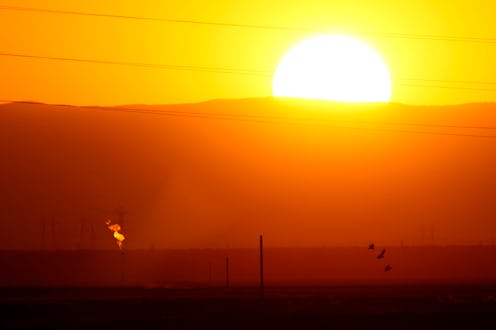News
Last Year Was The Hottest Year On Record
The data is in — 2014 is the hottest year on record, according to a new report by the National Oceanic and Atmospheric Administration (NOAA). Climate change is a hot issue in American politics, as it should be; nothing gets global warming-denying politicians sweating faster than new data indicating the opposite.
According to the data, the average global temperature for 2014 was 1.24 degrees Fahrenheit hotter than the average of 57.0 degrees for the last century. Previously, 2010 and 2005 held the record for the hottest years, but 2014 was warmer by .07 degrees.
In a statement analyzing the data, Stefan Rahmstorf, head of earth system analysis at the Potsdam Institute for Climate Impact Research said:
Obviously, a single year, even if it is a record, cannot tell us much about climate trends. However, the fact that the warmest years on record are 2014, 2010 and 2005 clearly indicates that global warming has not "stopped in 1998," as some like to falsely claim.
Why does anyone continue to question rising temperatures? As told to The Washington Post, Philip Mote, director, Oregon Climate Change Research Institute, offered some insight.
Global mean temperature is a fairly abstract concept to most of us: we relate to climate through direct experience, so if we remember a cold spell last year that may seem more pertinent or convincing than the global mean temperature.
Which brings us to the average global temperatures for 2014.
And here's a state-by-state breakdown comparing 2014 temperatures in America.
Which makes it trickier than ever for global warming opponents to deny that a steady change in our climate is going on around us.
The Midwest kept U.S. temperatures below the century average. With the exception of California and Alaska, the nation saw blistering cold weather classified as a polar vortex. Remember Buffalo getting hammered with several feet of lake effect snow?
The NOAA analysis concluded that winter weather wasn't the only case of extreme natural elements. France experienced the most rainfall since 1959, while Turkey was pounded with an unusual amount of rain — five times the annual average.
This information was released at a particularly interesting time, when Senate is expected to vote on whether climate change is still happening. The measure proposed by Democratic Sen. Bernie Sanders, will be included in the amendments to the Keystone XL bill, but only if the Majority Leader, Republican Sen. Mitch McConnell permits the addition.
What exactly does this data mean for climate change politics? Well, perhaps this information will alter how members of the Senate vote. But it could be inferred that opponents to the measure might cite the lower than average U.S. temperatures as proof that climate change is not a great concern, at least in America. The global average temperature is up, which raises serious questions on the role of mankind in global warming. It also opens up the opportunity for a conversation on what climate policy measures ought to be taken to curtail this trend.
Images: NOAA (2); Getty Images (1)
